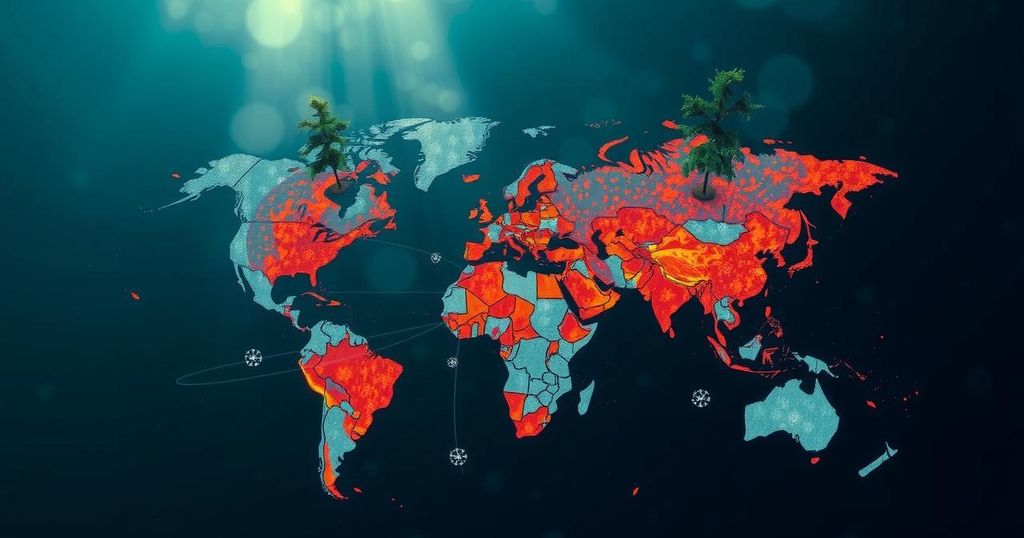A report from the Lancet Countdown reveals an alarming rise in heat-related deaths and diseases due to climate change, marking 2023 as the hottest year on record. The average person has encountered an additional 50 days of extreme temperatures, significantly impacting public health, particularly among the elderly. The report also highlights economic losses due to climate impacts, while calling for increased support for public health at the upcoming COP29 climate summit. Amid these challenges, some progress in reducing pollution and increasing renewable energy use has been noted.
A recent report by the Lancet Countdown highlights the alarming increase in heat-related deaths and diseases attributed to climate change. In 2023, which is projected to be the warmest year on record, the average individual faced an additional 50 days of hazardous temperatures compared to pre-climate change conditions. The findings reflect a growing trend of climate-related health crises, including a notable rise in extreme weather incidents and their devastating impacts on vulnerable populations, particularly the elderly. The report identifies ten out of fifteen monitored indicators exhibiting concerning new records, including a dramatic 167 percent increase in heat-related mortality for individuals over the age of 65 since the 1990s. The report’s executive director, Marina Belen Romanello, emphasized the multifaceted threats posed by climate change, noting, “Year on year, the deaths directly associated with climate change are increasing… heat is also affecting not just the mortality and increasing deaths, but also increasing the diseases and the pathologies associated with heat exposure.” Additionally, the economic repercussions of extreme temperatures have been significant, with the report estimating a loss of 512 billion potential labor hours last year, correlating to substantial monetary losses in global income. Furthermore, the report underscores the role of fossil fuel companies in exacerbating climate change by continuing to ramp up production, even amidst record profits, and governments ramping up subsidies for fossil fuels in response to geopolitical crises. As food security worsens due to severe droughts affecting 48 percent of the world’s land area and extreme rainfall leading to floods, approximately 151 million more individuals are now facing food insecurity compared to earlier decades. This compounding crisis is also heightening the spread of infectious diseases, thereby posing a dual threat to public health globally. The authors advocate for substantial financial support for public health initiatives at the upcoming COP29 climate summit, initiating on November 11th in Azerbaijan. Yet, amid these stark warnings, the report also notes a few positive trends, including a nearly seven percent decrease in deaths from fossil fuel-related air pollution and a marked increase in the use of renewable energy in electricity generation. Despite these flickers of hope, the overall message remains clear: no individual or economy can escape the health risks linked to climate change. This report serves as a clarion call for urgent action to mitigate these effects and protect public health.
The article centers around a report released by the Lancet Countdown, which involves insights from 122 health experts, including those from the World Health Organization. The report assesses the rising temperatures attributable to climate change and characterizes its impact on human health, particularly through heat-related deaths and the spread of infectious diseases. The report serves not only as a warning but also as a call to action for upcoming global climate policy discussions, emphasizing the critical intersection of health and climate change.
The Lancet Countdown report presents a dire picture of the escalating toll of climate change on public health, particularly concerning heat-related mortality and infectious disease proliferation. With extreme weather events on the rise and significant groups within populations exposed to heightened health risks, there is an urgent need for global leaders to take decisive action. The report underscores the interconnected nature of climate policy and health outcomes, urging investment in public health initiatives to combat the growing threats posed by climate change. The persistence of fossil fuel reliance and the resulting socioeconomic consequences further necessitate a shift towards sustainable practices.
Original Source: www.aljazeera.com







